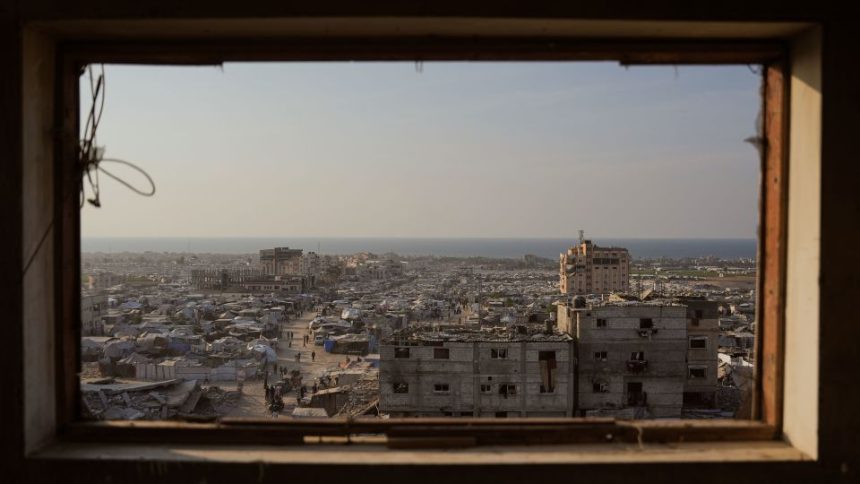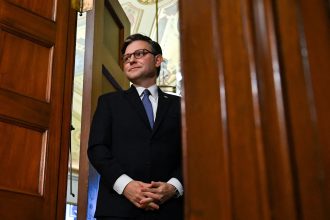The UN Security Council is scheduled to vote Monday on a resolution to take Gaza beyond the fragile truce that took effect last month to a more sustainable peace and reconstruction.
Its central features are a Board of Peace to run Gaza for a two-year period, supported by international forces and Palestinian police trained by Egypt. The Board would oversee the disarmament of Hamas and other factions – a key Israeli demand – and the reconstruction of Gaza, according to a draft of the resolution seen by CNN.
The resolution builds on US President Donald Trump’s 20-point peace plan unveiled in September but is already running into opposition from some in the Israeli government and may face a veto by either Russia or China – or both – when it comes to the vote.
Russia has put forward an alternative plan. And a veto from one of the permanent members of the Security Council would leave the plan in limbo, if not virtually dead in the water.
The resolution is also vague on sequencing and detail. Western diplomatic sources told CNN that the lack of detail in the resolution will make it hard to put into effect and are pessimistic that even if it passes, the current ceasefire will hold.
Here are some of its essential proposals, according to the draft.
Governance in Gaza
The resolution calls for “the establishment of the Board of Peace (BoP) as a transitional administration with international legal personality.”
This is Trump’s idea for interim governance in Gaza. The resolution says it will coordinate the redevelopment of Gaza in accordance with what’s called the Comprehensive Plan – Trump’s 20-point blueprint.
It’s as yet unclear who would serve on the BoP and just what its powers would be, according to diplomats familiar with the process.
Former British Prime Minister Tony Blair was at one point being suggested as leading the board under Trump’s chairmanship, despite his damaged standing among some Arab states over his support for the Iraq war, and the feeling among many Palestinians that he is pro-Israel.
According to Israeli officials last month, Prime Minister Benjamin Netanyahu said the Board would have no representatives of the Palestinian Authority, a rival to Hamas that runs parts of the occupied West Bank.
“Israel and the US are the ones who decide if it will meet the conditions, and there’s an entire wall of conditions,” he was quoted as saying.
Foreign troops
The BoP along with member states would stand up a “temporary International Stabilization Force (ISF) in Gaza to deploy under unified command,” according to the draft, in close consultation with Israel and Egypt.
It would ensure “the process of demilitarizing the Gaza Strip, including the destruction and prevention of rebuilding of the military, terror, and offensive infrastructure, as well as the permanent decommissioning of weapons from non-state armed groups,” according to the draft.
As the ISF “establishes control and stability,” the Israeli military would withdraw from Gaza “based on standards, milestones, and timeframes linked to demilitarization.”
This is – in short – a hornet’s nest. The sequencing will be hard to manage, and the ISF will have to carry out the complex task of disarming Hamas and other factions, which still retain an array of rockets and heavy weapons.
Hamas militants gather at the site of the handing over of the bodies of four Israeli hostages in Khan Younis, Gaza, on February 20. – Eyad Baba/AFP/Getty Images/File
Some Hamas officials continue to rule out disarmament of the group’s military wing. Hamas fighters would be reluctant to give up light weapons to protect themselves from other groups in Gaza seeking retribution.
Netanyahu has said that the BoP must take charge of Hamas’ disarmament and on Sunday reiterated that “Gaza will be demilitarized, and Hamas will be disarmed — either the easy way or the hard way.”
Several countries have been tipped as likely contributors to an ISF in Gaza, including Indonesia, Turkey and Egypt. But none has committed a contingent, and there has been little public discussion about a command structure, nor about the ISF’s relationship with a Palestinian police force being trained in Egypt.
Israel would very likely reject a Turkish role.
The Americans themselves won’t contribute boots on the ground and are struggling to assemble an international force willing to enter Gaza to demilitarize the strip, according to an Israeli official. The US is now considering skipping over the demilitarization stage and moving straight to reconstruction, the official told CNN. Such a move would infuriate Israel because it would leave Hamas with its weaponry.
That would undermine Washington’s own UN resolution and is unacceptable to Israel, the official said. The US was “moving toward interim solutions that Israel cannot accept.”
The Palestinian role in Gaza
According to the draft resolution, the BoP would at some point hand over to the Palestinian Authority (PA), when it “has satisfactorily completed its reform program.”
The draft does not expand on what those reforms should be but refers to a joint French-Saudi plan that includes a commitment by the PA “to hold democratic and transparent general and presidential elections within a year” of the ceasefire in Gaza.
Last week, President Emmanuel Macron said France would help the Palestinian Authority draft a constitution for a future Palestinian state, part of a broader effort to promote a two-state solution.
The Israeli government wants a civilian administration in Gaza that is led by neither the PA nor Hamas. But it would be hard to find enough qualified Palestinians without allegiance to either group to lead the reconstruction of Gaza.
A Palestinian State?
The elephant in the room.
The resolution says that depending on the PA’s progress “the conditions may finally be in place for a credible pathway to Palestinian self-determination and statehood. The United States will establish a dialogue between Israel and the Palestinians to agree on a political horizon for peaceful and prosperous coexistence.”
There are plenty of caveats in the phrasing but the pathway remains a possibility, something the Trump administration discounted in its early days.
The Israeli government has made it clear it will not accept a Palestinian state.
Ahead of a cabinet meeting Sunday, Netanyahu repeated that “Our opposition to a Palestinian state on any territory west of the Jordan River exists, remains in force, and has not changed in the slightest.”
Some far-right ministers have gone further. National Security Minister Itamar Ben Gvir said Sunday: “There is no such thing as a ‘Palestinian people.’ It is an invention with no historical, archaeological, or factual basis.”
Saudi Arabia, which is expected to have a major role in financing the reconstruction of Gaza, takes the opposite view. Its powerful crown prince meets Trump this week.
Saudi minister Manal Radwan told a conference in Bahrain two weeks ago: “A Palestinian state is a prerequisite for regional integration. We have said it many times.”
For more CNN news and newsletters create an account at CNN.com









